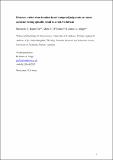Files in this item
Distance- rather than location-based temporal judgements are more accurate during episodic recall in a real-world task
Item metadata
| dc.contributor.author | Kuruvilla, Maneesh Varghese | |
| dc.contributor.author | O'Connor, Akira R. | |
| dc.contributor.author | Ainge, James A. | |
| dc.date.accessioned | 2021-06-24T23:35:42Z | |
| dc.date.available | 2021-06-24T23:35:42Z | |
| dc.date.issued | 2020-06-25 | |
| dc.identifier | 268487102 | |
| dc.identifier | 17be80c8-7616-4eaf-b256-dccfab423db5 | |
| dc.identifier | 85087460654 | |
| dc.identifier | 000547092000006 | |
| dc.identifier.citation | Kuruvilla , M V , O'Connor , A R & Ainge , J A 2020 , ' Distance- rather than location-based temporal judgements are more accurate during episodic recall in a real-world task ' , Memory , vol. Latest Articles . https://doi.org/10.1080/09658211.2020.1783319 | en |
| dc.identifier.issn | 0965-8211 | |
| dc.identifier.other | ORCID: /0000-0002-7943-5183/work/76777693 | |
| dc.identifier.other | ORCID: /0000-0002-0007-1533/work/76780013 | |
| dc.identifier.uri | https://hdl.handle.net/10023/23418 | |
| dc.description.abstract | Definitions of episodic memory typically emphasise the importance of spatiotemporal frameworks in the contextual reconstruction of episodic retrieval. However, our ability to retrieve specific temporal contexts of experienced episodes is poor. This has bearing on the prominence of temporal context in the definition and evaluation of episodic memory, particularly among non-human animals. Studies demonstrating that rats rely on elapsed time (distance) rather than specific timestamps (location) to disambiguate events have been used to suggest that human episodic memory is qualitatively different to other species. We examined whether humans were more accurate using a distance- or location-based method for judging when an event happened. Participants (n = 57) were exposed to a series of events and then asked either when (e.g., 1:03 pm) or how long ago (HLA; e.g., 33 min) a specific event took place. HLA judgements were significantly more accurate, particularly for the most recently experienced episode. Additionally, a significantly higher proportion of participants making HLA judgements accurately recalled non-temporal episodic features across all episodes. Finally, for participants given the choice of methods for making temporal judgements, a significantly higher proportion chose to use HLA judgements. These findings suggest that human and non-human temporal judgements are not qualitatively different. | |
| dc.format.extent | 457792 | |
| dc.language.iso | eng | |
| dc.relation.ispartof | Memory | en |
| dc.subject | Human episodic memory | en |
| dc.subject | Episodic-like memory | en |
| dc.subject | Passive encoding | en |
| dc.subject | Temporal estimation | en |
| dc.subject | Mental time travel | en |
| dc.subject | BF Psychology | en |
| dc.subject | RC0321 Neuroscience. Biological psychiatry. Neuropsychiatry | en |
| dc.subject | NDAS | en |
| dc.subject.lcc | BF | en |
| dc.subject.lcc | RC0321 | en |
| dc.title | Distance- rather than location-based temporal judgements are more accurate during episodic recall in a real-world task | en |
| dc.type | Journal article | en |
| dc.contributor.institution | University of St Andrews. School of Psychology and Neuroscience | en |
| dc.identifier.doi | 10.1080/09658211.2020.1783319 | |
| dc.description.status | Peer reviewed | en |
| dc.date.embargoedUntil | 2021-06-25 |
This item appears in the following Collection(s)
Items in the St Andrews Research Repository are protected by copyright, with all rights reserved, unless otherwise indicated.

